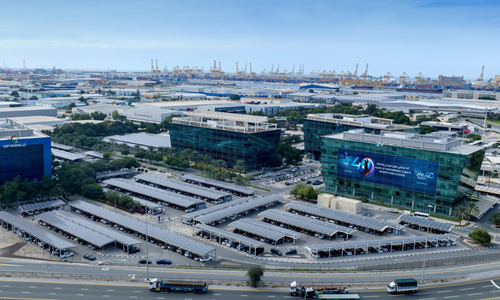By Sakani
JAFZA area guide (2025): Licenses, costs, and setup tips

If you're in logistics, manufacturing, or global trade, few places in the region offer the scale, infrastructure, and strategic positioning of JAFZA, the Jebel Ali Free Zone.
Located adjacent to Jebel Ali Port and Al Maktoum International Airport, JAFZA is Dubai's largest free zone and a gateway for companies looking to reach the GCC, Africa, and Asia.
This guide covers everything you need to know in 2025: license types, property options, activity eligibility, and what to expect when leasing or setting up a business in JAFZA.
What is JAFZA?
Established in 1985, JAFZA is one of the oldest and most prominent free zones in the UAE. It operates under the Dubai Ports (DP World) umbrella and supports more than 9,000 companies — including Fortune 500s, multinationals, and regional SMEs.
JAFZA offers:
100% foreign ownership
No import/export duties
Long-term land leases (up to 50 years)
Direct access to Jebel Ali Port and logistics corridors
Visa and corporate banking eligibility
Industrial-scale infrastructure (power, telecom, logistics)
It’s an ideal zone for companies involved in heavy operations, large-scale distribution, and cross-border trade.
What types of businesses thrive in JAFZA?
JAFZA is best suited for:
Logistics and supply chain companies
Manufacturing and assembly operations
Import/export and re-export businesses
Warehousing and distribution hubs
Construction materials and equipment suppliers
Oil & gas and energy-related enterprises
E-commerce fulfillment companies that need bulk storage
JAFZA also hosts companies in sectors like automotive, FMCG, industrial services, and maritime trade.
License types available in JAFZA
JAFZA offers several types of licenses depending on your activity:
Trading license – for import/export, distribution, and wholesaling
Industrial license – for manufacturing, processing, and assembly
Service license – for logistics, consulting, freight forwarding, etc.
E-commerce license – for digital trading and fulfillment
Innovation license – for R&D and IP-based activities
Offshore company setup – for holding structures and asset management (JAFZA Offshore)
You can also opt for dual-activity or combine compatible services under one license, subject to approval.
Mainland access: Can you operate outside JAFZA?
By default, JAFZA companies are licensed to operate within the free zone and globally.
If you want to serve clients in mainland Dubai or elsewhere in the UAE, you'll need to:
Appoint a local distributor, or
Open a mainland branch, or
Obtain a DET permit for certain activities (depending on scope)
Sakani always recommends confirming your operational scope before signing a property lease.
Property types and leasing options in JAFZA
JAFZA offers one of the most diverse ranges of commercial and industrial real estate in Dubai:
Warehouses – ready-built or custom-built units with high ceilings, loading docks, and industrial permits
Light industrial units – ideal for assembly or packaging operations
Office buildings – standard or executive office spaces, often in low-rise business parks
Land plots – for custom factory or logistics facility development
Showrooms – for businesses that need visibility plus warehouse access
Leases are long-term (up to 25–50 years) and usually handled directly by JAFZA.
Business setup steps in JAFZA (2025)
Choose your business activity and license type
Reserve a trade name and get initial approval
Select your property (warehouse, office, land, etc.)
Submit documentation (passport, application, business plan if needed)
Pay license and lease fees
Receive your trade license and registration certificate
Open a corporate bank account and apply for visas
Setup typically takes 1–2 weeks for straightforward cases.
Costs to expect in JAFZA
Here’s a general estimate (2025 ranges):
License fee: AED 10,000 – 15,000/year
Office lease: AED 25,000 – 60,000/year (depending on size and fit-out)
Warehouse lease: AED 35 – 55/sqft/year (base rent, plus service charges)
Visa package: AED 3,000 – 5,000 per visa (processing only)
Land plots: Custom pricing depending on location and usage
Always factor in service charges, deposit, and utility setup fees when budgeting.
Pros of setting up in JAFZA
Access to both sea and air logistics hubs
Large plot availability for scaling operations
No customs duties on goods inside the zone
Industrial zoning, flexible infrastructure, and high ceilings
Direct DP World support and integration with port systems
Long-term leases for stability and strategic planning
Things to consider
You can’t sell directly into the mainland without approvals
Office units are limited compared to newer free zones — better suited for operational businesses
Some license combinations require external authority approvals (e.g. food handling, medical devices, etc.)
Custom warehouses require time to build and approval cycles
Sakani tip: Don’t sign a warehouse lease without confirming license compatibility
Many businesses rush into leasing a space before checking whether their activity is approved in JAFZA, or whether the warehouse is built to industrial spec. On Sakani, listings in and around JAFZA are tagged by license type, zoning, and infrastructure specs, helping you avoid costly mistakes.
Final thoughts
JAFZA remains one of Dubai’s most powerful zones for businesses that move goods, build at scale, or rely on global logistics. With the right setup, it gives you unmatched access to shipping routes, land availability, and trade infrastructure.